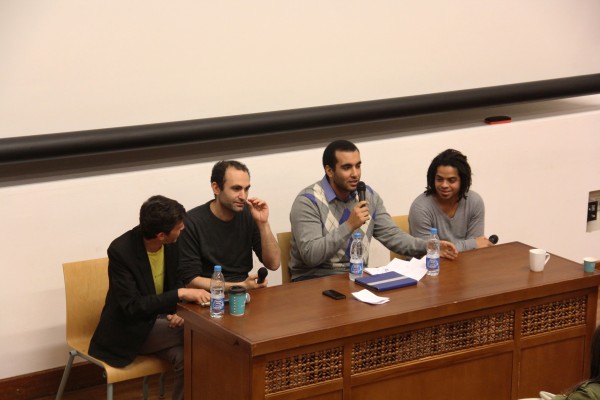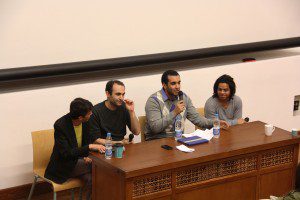BY MARIAM WAHBA AND
AMIRA SHERIF

Hundreds of students and faculty thronged Mansour Hall last week to watch 20 edited minutes of the popular documentary The Square.
The film, which has been nominated for a Documentary Feature Oscar this year, created a buzz on social media because it focuses on the trials and tribulations that came to symbolize the Egyptian uprising.
The Model Council of Ministers (MCM) Club, an organization that aims to spread political awareness among university students, organized the event.
The screening culminated in a question-and-answer session with Ahmed Hassan, Egyptian activist and one of The Square’s lead characters, and Khaled Abdalla of The Kite Runner acting fame, and founder of the production company ‘Cimateque’.
Former Student Union President, Taher Al Moataz Bellah moderated the panel.
“We did not leave the people with any other choices than the military, and this is our fault,” said Hassan, summarizing Egypt’s most recent political events.
Abdallah started off by describing how touching and emotional it is for him to be involved in political dialogue and debate, particularly regarding a film which highlights Egypt’s departure from its authoritative past.
“I was very disturbed with the idea of filming myself, because what was really happening wasn’t about me but it was about what was happening in the Square,” said Abdallah.
The actors explained that they met in Tahrir Square itself, and soon found a camaradrie as their tents were built next to each other in the protest camps that once dotted the famous Cairo landmark.
Abdallah said that Jehane Noujaim, an Egyptian American documentary film director best known for her films Control Room, Startup.com, and Pangea Day, started filming the rapid succession of events as they unfolded.
There was no planned script for the actors to follow.
“She was only trying to [archive] the revolution,” he added.
Abdallah said that the production of the movie was very challenging because as events proceeded, the crew found themselves in ‘Etihadeya’ (the nickname often given to the Presidential Palace in Heliopolis), where persistent protests called for then President Mohamed Morsi to step down.
The story was no longer about removing a president, but about whoever will replace him and whether or not the mistakes made by the former regime would be repeated.
“We discovered that the film is not about who the next president will be, but about the will of the Egyptian people themselves,” said Abdallah.
The two activists said that they are not happy with the country’s current direction and said that they will not vote for Defense Minister Abdel-Fattah El Sissi should he run for president in upcoming elections.
Abdallah added that one of the main values Egyptians acquired through the revolution is their ability to raise their voices in the streets to demand change.
“We forget that a revolution is a sign of failure,” said Abdallah referring to the conditions which spark such uprisings to begin with.
He said that for true developmental change to take hold in a country with renewed vision, archaic political paradigms of the past needed to be destroyed and rebuilt.
The documentary left many in Mansour Hall reminiscing about the populist uprising.
“It seemed as if we’re watching these clips for the first time,” Business sophomoreAhmed Magdy said.
He said the scenes of the Square stood the test of time and people are still affected by the events there.
The footage depicted some clips of Tahrir Square and explained how three passionate Egyptian activists stood together side by side during the protests against corruption, as they fought to rebuild a stable and thriving country.
The spirit of the film was enhanced when revolutionary music from the band Cairokee was played on the public announcement system.
“This has definitely set the people in the mood and it has taken the audience back in time when most of the Egyptians used to listen to these songs during the revolution,” said Nada ElSherbini, a film junior.
Academic Committee head Diaa Wang said that the event is part of a series launched by MCM to spread political awareness.